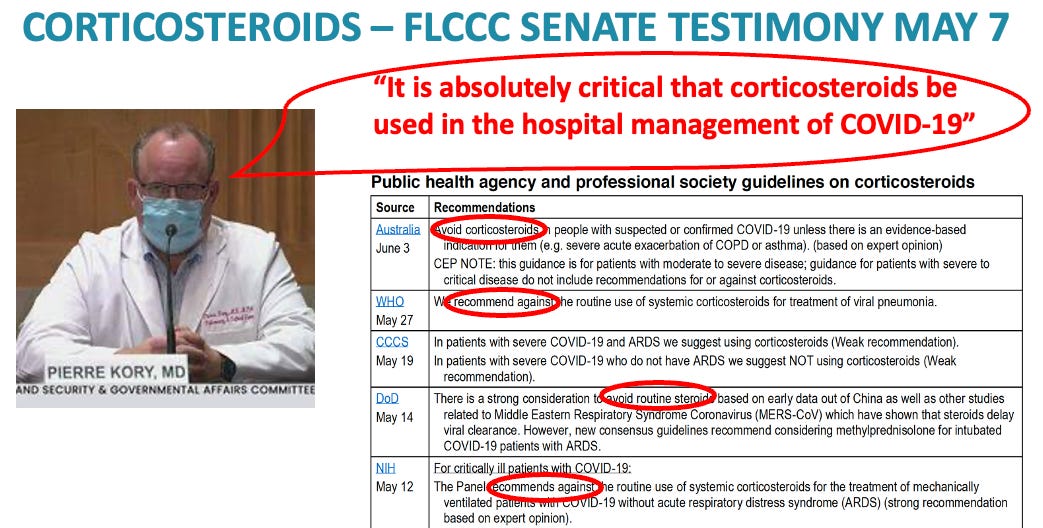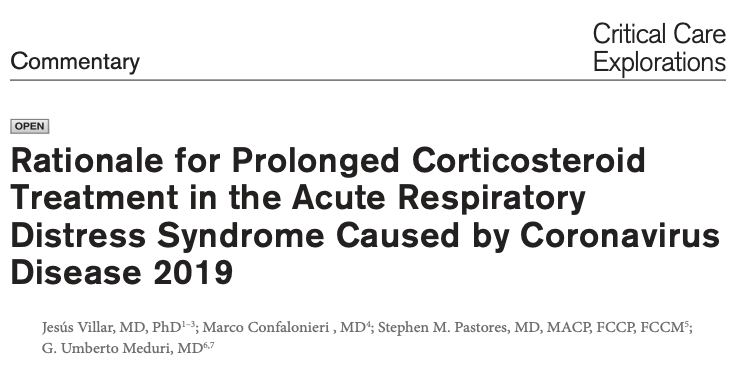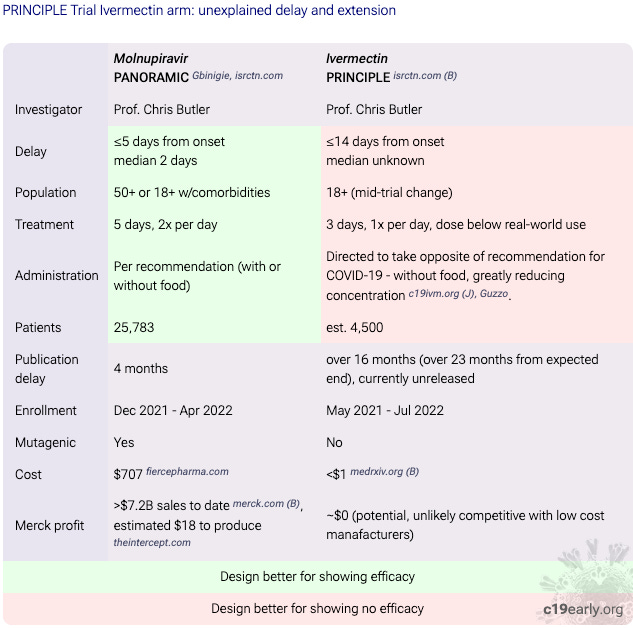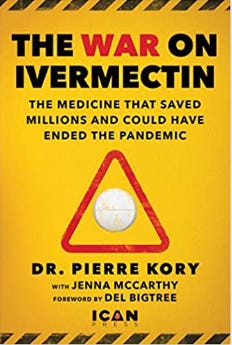Elon Musk's Comments On The Initial Use Of Mechanical Ventilation In the Covid Pandemic - Pt. 2
The near-global ignoring of the evidence supporting corticosteroid treatment in the hospital phase of Covid is what led to the initial historically unprecedented mortality rates. It wasn't the vents.
In Part 1 of this three part series triggered by Elon Musk’s comments on mechanical ventilation :), I argued that the unprecedented mortality rates observed with mechanical ventilation was almost completely due to the lack of effective treatments being offerred rather than the use of the ventilators alone.
In this post I will review all of the evidence that we had in the Spring of 2020 to supported the FLCCC’s recommendation to treat patients in the hospital phase of Covid with corticosteroids.
The problem we in the FLCCC had in 2020 with getting the world to use corticosteroids in the hospital phase were many (first is that we were not as well known then as we would later become when Paul Marik unwittingly launched us into the global war on ivermectin :). Anyway, at the time:
Most physicians believed that anything immunosuppressive would worsen the body’s “ability to fight off the virus” because, you know, it was a viral pneumonia (not). The fact that there was no live virus in the hospital phase of the disease showed this to be a tragic error borne of ignorance when estimating the risk of corticosteroids (I know, I know, there were no “errors” but this was the “consensus” thinking at the time by the average physician on the ground, even before medical propaganda was being issued in a torrent from the high-impact medical journals).
The above was compounded by the fact every national and international health care organization was recommending against corticosteroids at the time (purportedly for the same reason).
I was unable to rapidly publish my paper which argued that Covid-19 pulmonary disease was not a viral pneumonia and was instead a form of lung injury called “organizing pneumonia” (i.e. not infectious), whose first line treatment is corticosteroids. 5 journals and 6 months later, it was published in BMJ Open Respiratory Research.
So, the below was what I was up against in my first testimony in the U.S Senate on May 7, 2020:
It gets worse. Umberto Meduri, one of the founding members of the FLCCC and one of the world experts on the use of corticosteroid use in critical illness and lung injury syndromes, published this paper below in the journal of the Society of Critical Care Medicine in April of 2020, weeks before my testimony. The SCCM blasted it out as a bulletin to all 17,000 of it’s members. Response? Crickets.
In the above, Umberto and his colleagues meticulously re-analyzed the large observational corticosteroid trials from the SARS and MERS epidemics and found, after controlling for timing, type, and dose, that corticosteroid use led to large reductions in mortality. This was an analysis that the WHO and/or the NIH should have done… but didn’t.
Further, and more importantly, Umberto and colleagues included the early Covid data and recommendations from medical associations in China and Italy, both countries finding large mortality reductions when corticosteroids were used.
Re-reading the paper now, these sentences jumped out at me:
In conclusion, this is a critical moment for the world, in which even industrially advanced countries have rapidly reached ICU saturation and intensivists are forced to make difficult ethical decisions that are uncommon outside war zones. Although there is a wide divergence of opinion in the literature on whether corticosteroids should be used in patients with COVID-19, the two largest studies on H1N1 and SARS (n = 7,568) (25, 27) lend support to its use. However, the lack of sufficient evidence is not tantamount with negating the plausible efficacy of corticosteroids in COVID-19-associated ARDS. The stronger evidence for nonviral ARDS, the early reports from China, and the recommendations from the frontlines of China and Italy should be considered. Inconclusive clinical evidence should not be a reason for abandoning CST in COVID-19-associated ARDS. RCTs are in progress (NCT04273321, NCT04244591, NCT04325061, and NCT04323592) and results will not be available for months. Until then, there is no justification based on available evidence and professional ethics to categorically deny the use of CST in severe life-threatening “cytokine storm” associated with COVID-19 in hospitals not involved in a RCT.
This is part of the reasons why the FLCCC, during the first 7 months of the pandemic, near completely focused on the hospital phase of the disease with our first protocol called MATH+ that came out in early April 2020. Note how it primarily addresses inflammation and clotting (although ivermectin is included in the version below, it was actually not on the MATH+ protocol until 7 months later in November of 2020 when the clinical trials data amassed finding overwhelmingly positive impacts):
The actual “science” supporting corticosteroid use at the time of my testimony in May of 2020 was even stronger:
This remarkable study was available on a pre-print in early 2020 (albeit not published in a medical journal until Sept. 2021). In that study, the researchers matched the inflammatory gene expression patterns induced by SARS-CoV2 in human lung tissue against a database of the expression of inflammatory suppression genes activated by over 5,000 FDA-approved drugs.
They found methylprednisolone to be the drug with the greatest potential to revert the changes induced by COVID-19, while other closely related corticosteroids, such as dexamethasone or prednisone, were not. Methylprednisone was #1 out of over 5,000 medications. The FLCCC had already chosen methylprednisone based on the decades of research into corticosteroids that Umberto had done throughout his career.
Also note this sophisticated analytical search for existing therapeutics and their known mechanisms of action allows for the rapid identification of optimal treatments - a powerhouse approach in a pandemic situation (plus it avoids the years of delay and billions of dollars needed to develop novel, high-cost, patentable drugs such as the mutagenic molnupiravir or variant-driver paxlovid). Was this method used by any government health agency across the world? No. Just Big Pharma RCT’s please.
Then observational studies reporting large impacts on survival with corticosteroid use came out of Detroit and Italy on pre-print servers.. and were promptly ignored because again, they were not the cherished “gold-standard” double-blind, randomized controlled trials.
Here is where I get to again remind my readers that in clinical research (not in vitro or in vivo), on average, randomized vs. observation controlled trials throughout the history of modern evidence based medicine..reach the same conclusions. See this landmark systematic review paper from the Cochrane Library by Anglemeyer in 2014:
The above is a known fact, proven over decades, yet suppressed and fought against by Pharma who instead prefer medical journals to rely solely on big Pharma funded and conducted RCT’s to “prove” something works or doesn’t. One key difference between RCT’s and OCT’s is that the latter can be done by any motivated clinician or team of residents, students, fellows etc., simply by using electronic medical record systems and comparing the outcomes between patients already treated with the medicine vs. those who were not.
The most impactful statement in the conclusion above is “Factors other than study design per se need to be considered (I would say investigated) when exploring reasons between (discordant) results of RCT’s and observational studies.” I would start and end my investigation with looking for impacts of the bias of the RCT funding source. Things like the authors conflicts of interest (among other obvious influences like study design).
The best illustration of the bias of the funders of big RCT’s can be seen in the below table compiled by the best Covid research scientists in the world, the anonymous group at c19early.com:
In the above table, they list the trial design features employed by the same Principle Investigator at Oxford University who was tasked with studying two different early treatment drugs. One was a pricey, patented, pipeline pharmaceutical drug (Merck’s molnupiravir) and the other was an off-patent, repurposed, widely available, ridiculously safe and ridiculously inexpensive drug called ivermectin (ever hear of it?)
To summarize the table, it shows that for monupiravir, Oxford enrolled patients as early as possible, enrolled the sickest patients as possible, and treated at the highest doses for as long as possible.
For ivermectin, Oxford enrolled patients as late as possible, selecting the healthiest and most mildly ill as possible, treated with as low a dose as possible for as short a duration as possible (plus they instructed patients to take ivermectin on an empty stomach which lowers absorption). Not subtle eh? Why such major design differences between the two study drugs Professor Butler?
The most brazen difference was in the speed and size of the trial conducted. The molnupiravir study enrolled 25,000 patients a median of 2 days from first symptoms (a truly impressive result), finished the trial in 5 months, and published the trial 4 months later.
The ivermectin trial started enrolling 7 months before the molnupiravir trial, was less than a quarter of its size yet it took 14 months to conduct and we still don’t know the results even after 16 months since they completed the enrollment. Weird right?
Please don’t bother me with their bullshit excuses on their website about “requiring a one year follow-up of patients after the study ended before publishing the results.” Puleeze. They weren’t studying cancer, they were studying an acute viral syndrome. Also, this one year follow-up period was never in their original trial protocol yet it magically appeared during or at the end of the trial. Whatever.
Forgive me for I digress. Again, the above data and insights on corticosteroids led me to testify for the first time in the Senate in May of 2020, where I (we) recommended that the world use corticosteroids in the hospital phase of Covid (again, I did this at a time that every national and international health care organization recommending against doing so). It was also the first (but not last) time I lost my temper a bit during U.S Senate testimony - exasperation starts at 12:30. I also talked about avoiding use of early intubation! (More on that in my 3rd post which is already available).
I presented the findings from our papers above, the recommendations by the Chinese and the Italian societies, and concluded with testimony from physicians on social media who were posting, largely anonymously, compelling observations and experiences, essentially crying out for doctors to start using corticosteroids at the first sign of low oxygen in COVID patients.
Some memorable posts read as follows (they were in my official written testimony to the Senate):
“We floundered for two weeks. Lots of codes, intubations and death. Maybe 15 discharges. We started steroids and discharged 250 patients. Less intubations, less codes. And the ones that ended up on vent, not as serious. CXR/CT Changes = steroids. Hypoxia on admission = steroids. Ambulatory hypoxia = steroids. Completely changed our trajectory. Steroids are a game changer.” Hospitalist, SE Michigan - our group is taking care of 700 plus COVID+ patients
“I'm here in New Orleans, since we started using steroids, we were able to free ventilators and get elderly patients out of the hospital without needing a ventilator. Patients that were obviously crashing quickly, who we had to have end of life talk with were able to walk out of the hospital. At no point did any of our patient’s worsen because of steroids. These patients shed viruses 4 weeks later, with or without steroids. The virus doesn't kill anybody, it’s the inflammation that does. Let the virus replicate however slow down the inflammation”
But remember, modern evidence-based maniacism does not believe in anything but a “Big RCT”, designed and conducted by a heavily funded public health agency or corporation (same thing). And, as I have written before, the control of funding and design of Big RCT’s is literally the main tactic that corporate (and other) interests use to get doctors to believe and do everything “they” want them to - things like;
remdesivir is an effective or safe drug in hospitalized patients
statins prevent and/or treat heart attacks and strokes
SSRI’s are safe and effective anti-depressants
mRNA vaccines are safe and effective
ivermectin and hydroxychloroquine are both highly dangerous and woefully ineffective in treating Covid.
The last campaign against IVM and HCQ was so effective that doctors who dissented with their analyses or worse, actually treated patients with such dangerous and ineffective drugs had their medical licenses and livelihoods stripped, board certifications revoked, social media accounts deplatformed, and endured endless regime media attacks (my new favorite word).
Until the system docs wake up to the research trial and publication fraud endemic in modern biomedical sciences, that entire system rot will continue to kill patients. One hopeful sign is that the rot has never been so exposed before as it was during Covid, so much so that many physicians and patients have started to flee that system (this is probably a good time to plug our upcoming FLCCC conference where we plan to offer and launch a sort of “home” for the increasing amount of medical system refugees.
This exodus will continue as long as “system” doctors continue to pray at the altar of an evidence based medicine system that has been completely captured by industry and regularly spews out sophisticated sounding statistical lies from the top medical journals in the world.
Anyway, as you can imagine, my testimony fell on deaf ears at the time. Inexplicably high mortality rates with frequent prolonged durations of mechanical ventilation (MV) continued to be observed and reported. These reports were emanating from centers expert in supportive care strategies. Unsurprisingly, these same centers were literally running out of ventilators such that state and federal governmental agencies started scrambling and competing to purchase huge lots of them (as the Chief of the Critical Care Service at UW and an expert in mechanical ventilation, I was regularly consulted by the Wisconsin ventilator procurement officer to rapidly evaluate various machines coming onto the newly chaotic ventilator market).
There was one country that “listened” to the FLCCC however… Ukraine! Two papers were published on our protocol by prominent Ukrainian physicians and we heard from good authority that MATH+ was being widely deployed in hospitals there (one paper was in English, the other in Ukrainian as seen below):
However, despite this, the first “attacks” from the medical system and media towards me, Paul, Umberto and the FLCCC came in the wake of that first Senate testimony in May. The censorship began to ramp up as well.
Sadly, it was not until months later that our recommendation to use corticosteroids became the standard of care for the hospital phase of Covid worldwide, after the publication of the RECOVERY trial from Oxford in July of 2020. Mortality rates in hospitalized patients thereafter began to plummet.
So Elon, the above is why I believe it was the lack of effective treatments in the hospital phase (and pre-hospital phase) that led so many to the often “death sentence” of a mechanical ventilator rather than the mechanical ventilator itself. That and the fact that ventilators alone do not kill people, period. Inappropriate use does cause harm and can worsen prognosis but would still not be the proximate cause of death in the overwhelming majority of cases. Ventilators don’t kill people but crappy medical care does.
However, mechanical ventilation was definitely misused in early Covid and did cause harms. I more deeply explore this issue in Part 3 (already available).
*I just want to say that writing this Substack is only one of my jobs, and I put a lot of work into it (at the cost of sleep and personal time). I also believe in an ethos of paying people for their work. If you love this Substack, get value out of it, and believe in paying people for their work, consider a paid subscription. Thanks, Pierre
P.P.S - Proud to report that my book is gaining Best Seller status on Amazon in several countries and is climbing up the U.S Amazon rankings… Link:










“...Most physicians believed... because, you know, it was a viral pneumonia... The fact that there was no live virus in the hospital phase of the disease showed this to be a tragic error borne of ignorance...”
“Error” is an exceptional event that disrupts the course of the routine. Once it happens, the routine should be stopped to find out the cause, examine its nature, and make corrections necessary to ensure error-free flow of the routine. That’s common sense. That’s also the standard way of handling errors in every imaginable field of human activities, from computer programming to air traffic control to manufacturing electrical components and more, much much more. All over the world, in all businesses, in all areas, there is no room for “ignorance” causing more than one error. If you allow a second error, you will lose business, pay huge damages and compensation, and suffer huge financial losses in the defective manufacturing process.
Why should medicine be any different?
When one patient dies on your ward, on your watch, with your signature - you must immediately stop all running processes related to the deceased and their circumstances. It’s common sense. And criminal liability. You must immediately examine all factors down to the smallest detail. If you don’t do this and you blindly fly into more deaths, it’s gross negligence and outrageous betrayal of your profession.
If you skip this step, or force “but we follow all proper guidance” on your mind, you are not fit for any profession related to human health.
The ventilatorgate simply exposed the underlying acceptance of non-thinking throughout the healthcare environment worldwide. There is no going back to “trust” after this. What’s worse is that we are observing the continuous aggravation of neglect in medicine despite the persistent fourth year of a medical disaster of the scale that has never happened before.
Error?
I wouldn’t say Elon was wrong. It wasn’t necessarily the machines but the medical judgement to put people on the machines vs. other treatment options.